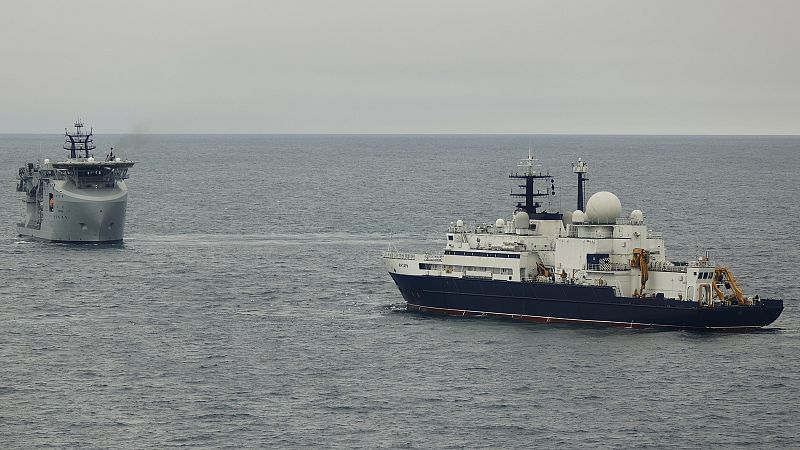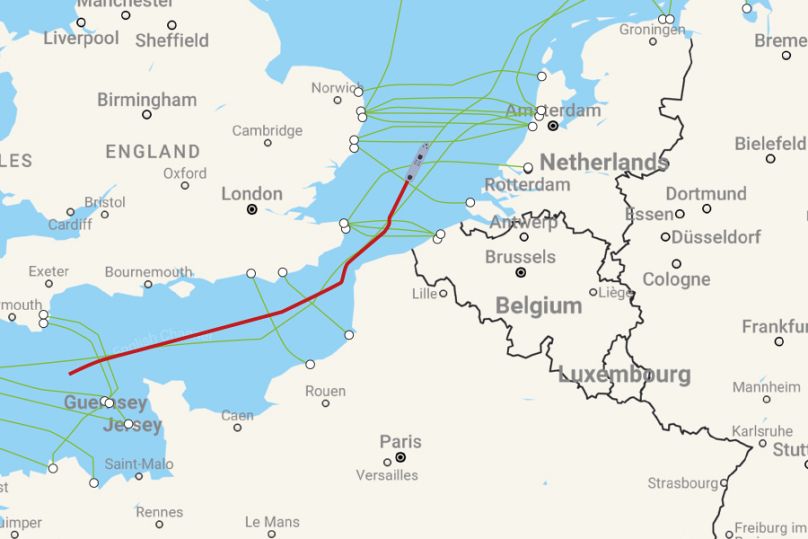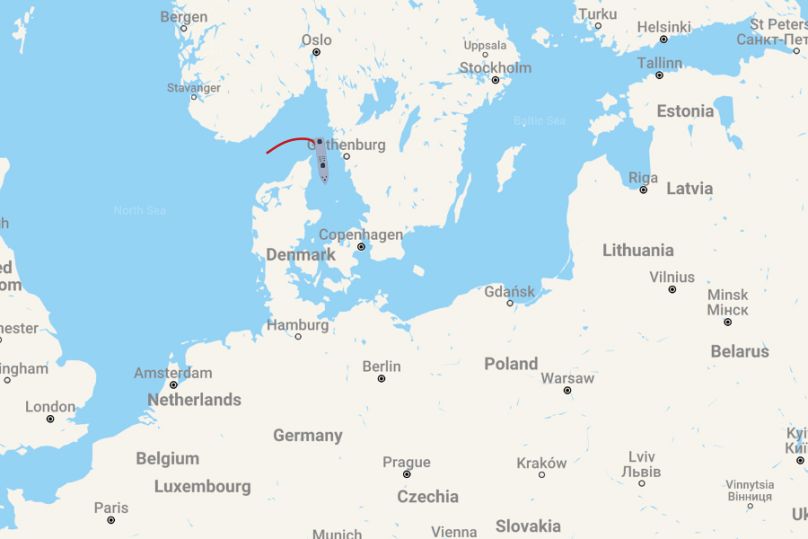What do we know about the Russian ‘spy ship’ Yantar tracked in UK waters?

"We see you." That was UK Defence Secretary John Healey’s defiant warning to Russia's President Vladimir Putin after his spy ship was spotted in UK waters this week.
The ship, known as Yantar, is operated by a Russian Ministry of Defence agency and officially carries out oceanographic research. But Western officials believe it is used for deep-sea espionage.
Yantar is well-known to European governments and is commonly escorted by their naval commands.
Yet the ship's latest passage through European waters comes at a sensitive time: NATO is stepping upits military presence in the Baltic after a power cable was damaged on Christmas Day. Investigations have centred on an oil tanker suspected to be part of the Kremlin’s sanctions-busting shadow fleet.
It follows a raft of similar incidents suspected of being acts of sabotage, which have deepenedfearsthat Europe’s undersea communications cables, gas pipelines and power interconnectors are vulnerable targets in Russia’s hybrid war.
Euronews’ fact-checking team delves into what we know about Yantar and its operations.
What do we know about Yantar?
Yantar has been operating for Russia’s underwater research agency, GUGI, since 2015 under the guise of research.
GUGI is considered a secretive outfit. Originally founded as part of the Russian navy, it now operates independently for the Ministry of Defence. In addition to Yantar, its fleet includes several specialised submarines, some of them nuclear-powered.
Yantar is specifically designed for intelligence gathering. It can hover over a location and deposit and retrieve objects from the seabed. It also hosts manned deep-sea submarines that can reach 6,000 metres below water and deep-sea robots that are tethered to the ship.
Open Source Intelligence (OSINT) analyst H I Sutton, who specialises in submarines and sub-surface systems, described the ship as a “special, unique” mothership.
“Yantar, I would speculate, was intended to conduct seabed operations that didn't require the extreme stealth of the submarines, and it could do it much cheaper,” he explained.
Yantar is equipped with electronic sensors for mapping the seabed and a dome for communications, indicating it is likely used to map the network of critical pipelines and network cables that connect Western countries.
When did it enter UK waters and why was it pursued by the Royal Navy?
Yantar was first detected on Monday 45 miles (83.3km) off the British coast, inside the UK’s exclusive economic zone (EEZ).
According to Euronews’ analysis of the vessel’s tracking data, on Tuesday it had passed through the Channel, heading eastwards towards Belgian and Dutch waters.
Its passage through the Channel sees it track close to Atlantic Crossing 1, an undersea telecommunications cable linking the United States with the United Kingdom, the Netherlands and Germany.
On Friday, the vessel was in the Kattegat strait between Denmark and Sweden, according to marine tracking data, suggesting it was heading back to a base in St Petersburg.
The UK sent two Royal Navy ships, HMS Somerset and HMS Tyne, to track Yantar on Wednesday. The Ministry of Defence says it "changed the navy’s rules of engagement" to allow the ships to get closer to the vessel.
Experts say it is normal for Russian vessels to be escorted while passing through European waters. But in a highly unusual move, a Royal Navy submarine was also authorised to surface close to the Russian ship.
"I can't remember that ever happening before. It’s not generally something you tend to advertise to your opponents," Mike Plunkett, a naval expert for Janes Intelligence, told Euronews.
"I think it was a message to the Russians: We know what you do with this ship. We watch you."
The UK’s defence secretary said that the vessel was a "spy ship" used for "mapping the UK’s critical underwater infrastructure."
It marks the strongest public rhetoric from any European government yet about Yantar’s intelligence-gathering operations.
Where else has it been spotted in European waters?
Yantar was escorted from Irish and British territorial waters in November after it was seen "loitering over UK critical undersea infrastructure," according to the UK defence secretary.
Later in November, the ship was detected entering the Mediterranean through the Strait of Gibraltar before stopping at the port of Algiers.
Yantar was then sent to survey the wreck of MV Ursa Major, a Kremlin-linked cargo ship which sank in the Mediterranean Sea between Spain and Algeria following an explosion onboard on 23 December.
It is believed Ursa Major was transporting weapons from Syria, where Kremlin-aligned president Bashar al-Assad was toppled earlier in December, casting doubt over the future of Russia’smilitary basesin the country.
The ship’s owner company, closely associated with the Kremlin, has described it as an "act of terrorism".
Naval analysts widely consider Ursa Major’s sinking suspicious. While little is known about Yantar’s mission to survey the damage, naval analyst Sutton says it was likely gathering evidence about its sinking and potentially "retrieving or destroying" sensitive equipment.
Could information gathered by Yantar be used for future acts of sabotage?
There is no declassified intelligence to prove Yantar’s mapping operations have been used in suspected acts of sabotage, where vessels drag their anchors across the seabed in a bid to sever cables.
But Yantar’s suspicious activity and the frequency of suspected sabotage means Europe is increasingly alert to Russia’s threat.
Last April, a critical undersea communications cable to a Norwegian air base in the Arctic was damaged. In November, two cables in the Baltic Sea were severed, including the only undersea data cable connecting Finland with central Europe.
Investigations into the latest suspected sabotage, which saw the Estlink-2 cable damaged in the Baltic on Christmas Day, have centred on an oil tanker believed to be part of Russia’s so-called shadow fleet.
While the Washington Post has since cited Western officials claiming it was likely an accident, European politicians have hinted at an intended act of sabotage orchestrated by Moscow.
“I think it’s unlikely all of them (the incidents) were accidents. Something is going on there, whether it's a deliberate campaign or just a test to see whether it's even possible to break a cable with an anchor,” Mike Plunkett of Janes Intelligence said.
Using its shadow fleet provides the Kremlin with an “extra layer of deniability,” Plunkett explained. The fleet's ownership, management, and flagging arrangements are all opaque, making it difficult for Western authorities to investigate or trace control of the vessels back to Russia.
Yesterday



